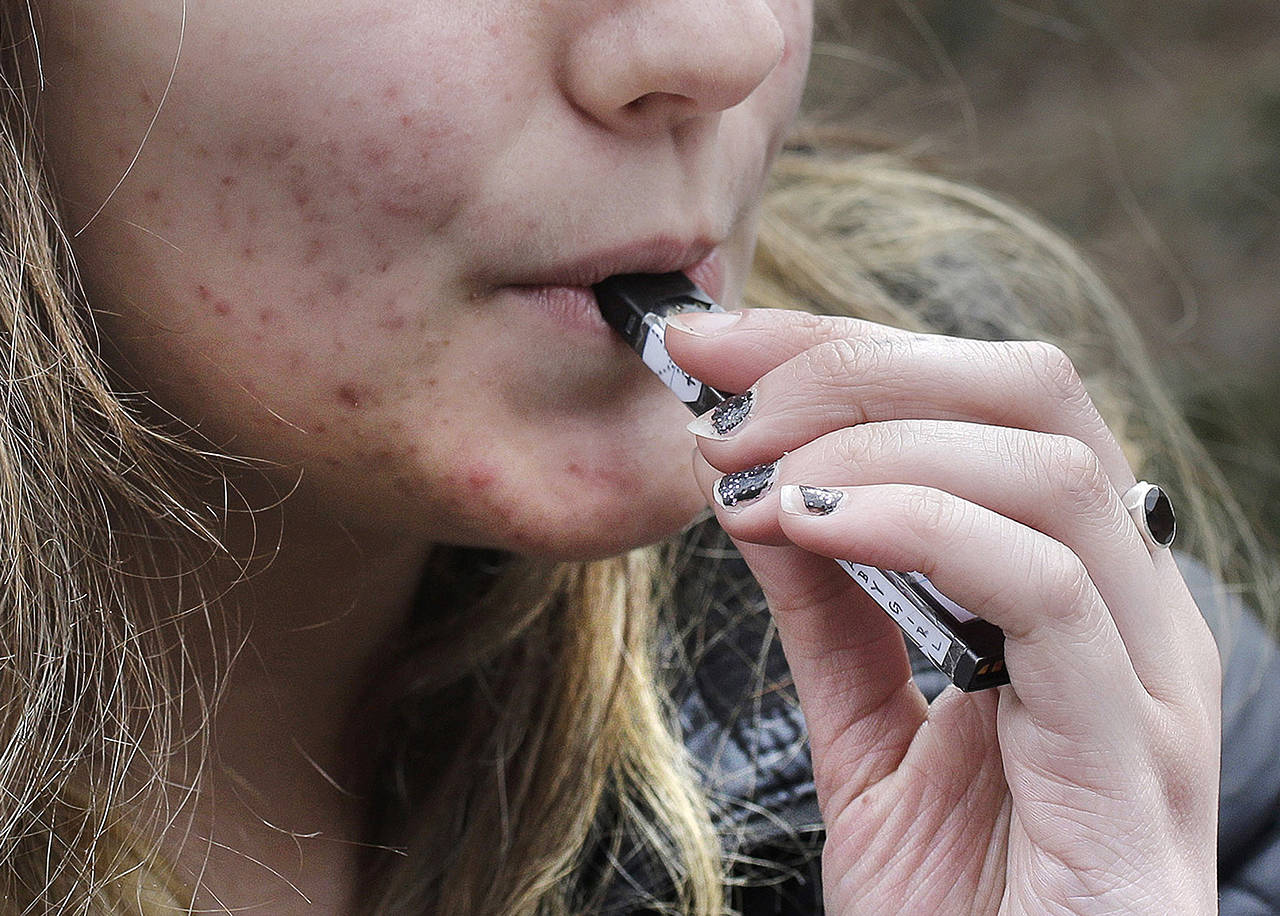By The Herald Editorial Board
As parents begin their preparations for the coming school year, now would be a good time to have that talk with their kids.
No, not that talk; though that’s inescapable at some point, too.
No, this discussion would be about tobacco and nicotine and — more specifically — vaping with e-cigarettes such as the market-leading Juul devices.
There’s increasing concern about vaping because of the surge in use among teens and young adults and new reports of health concerns that have accompanied the trend in use.
A look at results recently released in the state’s Healthy Youth Survey mirror nationwide reports about the huge increase in vaping among youths, one that the former chief of the U.S. Food and Drug Administration, Dr. Scott Gottlieb, called an epidemic, with 3.6 million youths reporting use of e-cigarettes as of 2018, adding 1.3 million new e-cigarette users between 2017 and 2018 alone.
The Healthy Youth Survey, a joint effort among the state Office of the Superintendent of Public Instruction, the Department of Health and other agencies, surveys students in the eighth, 10th and 12th grades every two years on a range of health issues.
Results of the survey completed in the fall of 2018, regarding tobacco, found that cigarette use has fallen dramatically since the 2016 survey; down 9 percentage points to 5 percent of 10th graders and down 12 percent points to 8 percent of 12th graders.
But that encouraging news gets lost in a vapor cloud: 30 percent of 12th graders used e-cigarettes, up 10 percentage points from two years previous; among 10th graders, vaping increased to 21 percent from 13 percent; and among eighth graders, use increased to 10 percent up from 6 percent.
The numbers for Snohomish County students were similar: 30 percent of 12th graders, 23 percent of 10th graders and 10 percent of eighth graders.
Among the 10th graders who vaped, 56 percent reported using products containing nicotine and 21 percent said they had used pods containing THC, the psychoactive compound in cannabis.
E-cigarettes, their promoters and users claim, were developed as a less-harmful alternative to cigarettes and as one route to smoking cessation. They are often used that way, but the message that they are less harmful may have been misunderstood among many youths.
The survey found that while 74 percent of 10th graders surveyed understood cigarettes to be harmful to their health, only 35 percent saw e-cigarettes in the same light.
Vaping doesn’t deserve that reputation, especially when it comes to youths, whose brains continue their development until the age of 26.
The Washington Post reported Friday that pediatricians are seeing more teens who are behaving less like tobacco users and more like patients with substance abuse problems. Sharon Levy, director of the Adolescent Substance Use and Addiction Program at Boston Children’s Hospital told the Post, “This is something really different.”
“With the Juuls, kids are able to get a much higher dose of nicotine — and dose matters,” Levy said. “These kids have behaviors that we often see in patients who have opioid or marijuana addiction, but we didn’t typically see with kids who developed addiction to traditional tobacco cigarettes.”
Typically, the nicotine-laden pods used with Juul and other vape pens contain about the same amount of nicotine as a pack of cigarettes. And some youths are consuming a pod a day. The result is nicotine toxicity and respiratory problems.
There’s also the frightening concern that nicotine addiction at a young age, again when the brain still is developing and teens have less impulse control, can increase their susceptibility to other addictions.
Welcome action was taken by state lawmakers this year when the Legislature passed not only a law increasing the age for tobacco products, including vaping products, to 21 from 18, but also a new tax on vaping products that will help fund smoking cessation and other health programs and will fund cancer research. The new age restriction takes effect Jan. 1, while vape pens and related products will be taxed beginning Oct. 1.
Congress, likewise, also is considering a nationwide increase in the smoking and vaping age to 21.
Juul, itself, deserves some credit for campaigning for the age change and for removing its flavored pods from retail shelves, although those remain available online.
The flavors, typically fruit and other sweet flavors, are hard to see as anything but attempts to market to and hook youths. As recently as 2018, the FDA had to go after one vape “juice” maker that packaged its product to look like a Tree Top apple juice box. That history among vape-product companies makes it difficult to fully relieve suspicion of Juul’s motives.
Laws to raise the smoking and vaping age should help by making those products less accessible, particularly among younger teens who were buying or getting vaping materials from young adults.
But the responsibility remains with parents — and teen peers — to discourage youths from starting use of any tobacco product and to encourage users to quit.
Every student deserves to start the school year with a clear head and healthy lungs.
Help to quit
The Healthy Youth Survey offers resources for parents and others regarding vaping and smoking:
Proven tips on how to talk, monitor and relate to teens are available at www.StartTalkingNow.org.
The state Department of Health offers a free tobacco cessation program through a smartphone app at www.doh.wa.gov/quit.
And Truth Initiative, a nonprofit public health organization, offers a free text message program that offers tips and support by texting “DitchJuul” to 88709.
The Snohomish Health District offers more information on vaping and vaping products at tinyurl.com/SnoHealthVaping.
Talk to us
> Give us your news tips.
> Send us a letter to the editor.
> More Herald contact information.

























